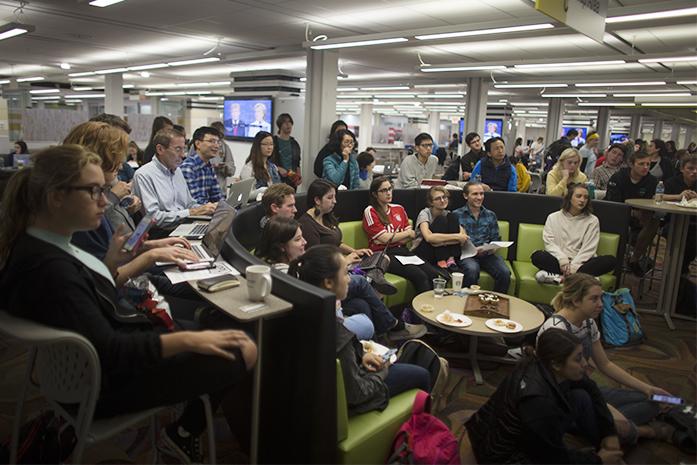By Matthew Jack
Republican presidential candidate Donald Trump doubled-down on rhetoric that seeks to sow seeds of doubt among American voters about the legitimacy of the 2016 election during the third and final presidential debate Wednesday night.
Debate moderator Chris Wallace of Fox News called upon Trump to confirm a pledge made by his running mate, Mike Pence, “that [he and Trump] will absolutely accept the result of this election.” Trump refused to join Pence, saying he “will look at it at the time. I’m not looking at anything now.”
On Twitter this week, Trump said the “election is absolutely being rigged by the dishonest and distorted media.”
Iowa Democratic Party spokeswoman Monica Biddix condemned his answer in a statement, saying “Donald Trump’s continued claims that the election is ‘rigged’ is a threat to our democracy and sets a dangerous precedent for future elections.”
Iowa Gov. Terry Branstad said at a news conference on Monday that he agreed with Trump on his suspicions of voter fraud, which Biddix called “shameful” in the statement.
A spokesman for Branstad did not immediately respond to a request for comment.
Iowa Republican Secretary of State Paul Pate, the state’s highest elections official, on Monday promised a fair and honest election to Iowa voters.
“I assure you it will be counted, and no one will be doing anything to tamper with it,” he said.
U.S. Speaker of the House Paul Ryan — whose relationship with Trump has soured since a recording was leaked of Trump making lewd, vulgar comments about groping women — sought to squash any doubt in the rectitude of U.S. elections.
“Our democracy relies on confidence in election results,” said Ryan spokesperson AshLee Strong in a statement. “The speaker is fully confident the states will carry out this election with integrity.”
University of Iowa students interviewed by The Daily Iowan were split on the voter-fraud issue.
Patrick Wronkiewicz, a former U.S. Marine and current UI sophomore studying pre-business and political-science, said that although he does not agree with Trump’s claims that the election is rigged, he thinks Hillary Clinton is corrupt, saying that she has “built a really good machine, and she’s just a better politician.”
Chase Woods, a UI sophomore studying business, said he was concerned about voter fraud, and he was happy Trump vowed to fight it.
“I think it’s real. There’s dead people that vote all the time, and they always vote Democratic,” he said. “I like that he’s going to fight it — I just think it’s wrong.”
The debate, hosted at the University of Nevada-Las Vegas, was the last chance for the candidates to plug their policies and offer their broadest opportunity to reach new or undecided voters.
David Hingstman, a UI communications associate professor and the coach of the UI debate team, said he thought both candidates failed to do so.
“We got a reprise of the ‘greatest hits,’ ” he said. “Even the insults were things that had been said before. The only one who was trying to bring in new issues was Chris Wallace.”
Nathan Kelley, the head of IC Pride and an elementary-school music teacher who supported Clinton in 2008, said he was disappointed neither candidate addressed LGBTQ concerns.
“I was hoping they would bring [LGBTQ rights] up during the first question when they were talking about the Supreme Court,” Kelley said.
Kelley said IC Pride has been trying to get the younger members of their community to understand that the Supreme Court justices Trump would appoint are not just anti-abortion, they could also repeal federal gay-rights legislation.
Regarding the general electorate, “I don’t think [this debate] is going to change anyone’s mind,” he said.
According to a 2008 Gallup study, debate victories rarely have substantive effects on candidates’ poll numbers except “in highly competitive election years,” when “any movement in voter preferences can be race altering.”
The candidates’ poll numbers have oscillated since their campaign announcements, but Clinton has been the general front-runner, excluding brief leads Trump took in late May and in the days after the Republican National Convention.
“The cake is baked, and I’m not sure there is a last debate ‘Hail Mary,’” said Iowa State political-science Professor Steffen Schmidt in an email earlier Wednesday. “The debate won’t really change anything unless there is an explosion — good or bad — by one of them.”
EPI reporters Maria Curi and Emily Kresse, and EPI Editor Mitch McAndrew contributed to this story.



